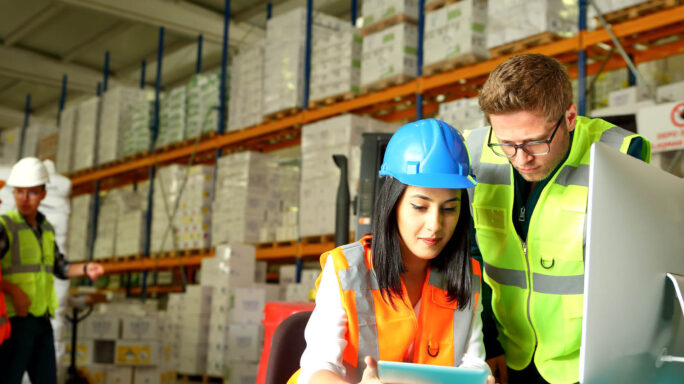Strategy, Legal & Operations
How will Brexit affect businesses? 9 things you need to know
How will Brexit affect businesses in Ireland? This article answers a number of questions to help you do business in a post-Brexit world.

We might be forgiven for feeling some fatigue when the subject of Brexit is raised. In the recent general election, polling revealed 1% of the electorate felt Brexit decided their vote.
Yet for businesses, the end of the UK’s Brexit transition period on 31 December 2020 means very real changes in the way they operate with those in the north, along with England, Wales and Scotland.
According to the Central Statistics Office, for September 2020, 22.7% of all imports to Ireland come from the UK, while 9.1% of all Irish exports go there.
In other words, the UK continues to be a significant trading partner for Irish businesses.
This article answers frequently asked questions about Brexit that might inform or even kick-start the Brexit preparations in your business.
It’s important to note that the UK-European Union (EU) withdrawal agreements treat Northern Ireland differently compared to the island of Great Britain (England, Scotland and Wales). We make this distinction as required throughout this blog.
The following questions are addressed:
2. What’s happening in Ireland because of Brexit/end of the transition period?
3. What’s happening in Northern Ireland because of Brexit/end of the transition period?
4. How does Brexit affect trade and how will Brexit affect my business?
5. My business is based in Ireland and only has Irish customers. Will I be affected by Brexit?
7. How do I perform a Brexit impact assessment?
8. How will Brexit affect the GDPR?
9. Are Sage products ready for Brexit?
1. What is Brexit?
In a referendum on 23 June 2016, the UK electorate voted to leave the EU. The UK subsequently left the EU on 31 January 2020.
The leave date triggered a transition period in the country, sometimes called the withdrawal period. This meant that, until 31 December 2020, most EU legislation governing areas such as trade with businesses in the EU would continue to apply. It meant little would change for most people and businesses.
However, as of 1 January 2021, the UK is no longer bound by EU’s institutions or legislation. For example, the UK becomes responsible for its own trade rules, and customs borders will exist between Great Britain and countries in the EU.
Although there have been a series of last-minute decisions during the Brexit negotiations, there is no doubt that the end of the Brexit transition period will occur on 31 December 2020, so businesses need to prepare immediately.
The UK’s relationship with Ireland and the mutual desire to uphold the Good Friday Agreement means there will be no physical border on the island.
Goods will be able to move between the south and north, just as they did prior to Brexit.
2. What’s happening in Ireland because of Brexit/end of the transition period?
In simple terms, following the end of the transition period, Ireland will treat the countries in Great Britain as they do non-EU countries.
However, the unique relationship between the UK and Ireland, and the mutual desire to respect the Good Friday Agreement, means there are arrangements to avoid a physical border on the island of Ireland.
Trading goods with Great Britain (over £135 in value)
Using the hypothetical example of a Dublin-based business importing goods from a business in Manchester, there will be the following minimum considerations following the end of the UK’s Brexit transition period:
- Both the Dublin business and its supplier in Manchester will require relevant Economic Operators Registration and Identification (EORI) numbers issued by their governments.
- The exporter in Manchester will have to complete export paperwork for the UK government. This should be discussed with them in advance, and supply contracts altered as required.
- It will be necessary for the Dublin business to file an Automated Import System (AIS) electronic declaration with Revenue, using compatible software. This will involve providing the correct AIS commodity code, among other things. Alternatively, you can use an intermediary such as a customs broker to handle this for you.
- Prior to the goods departing Manchester, an Entry Summary Declaration (ENS) providing a Safety and Security (S&S) declaration must be electronically submitted to Revenue. This must also be supplied to the carrier of the goods.
- Prior to the goods departing Manchester, and assuming a roll-on, roll-off (RoRo) ferry service is used, a Pre-Boarding Notification (PBN) must be submitted to Irish customs, typically by the haulier. Only one of these is required per vehicle.
- Customs and excise duties might become payable on the imported goods. These can be deferred using the deferred payment system, although the Dublin-based business will need to have applied for this, and been authorised, in advance.
- Irish VAT becomes payable on imports, and the distance selling rules no longer apply. The VAT can be paid immediately by the business in Dublin, but most importers to Ireland are likely to use the postponed VAT accounting system along with the deferred payment system mentioned earlier. This lets them account the VAT in their next VAT return, using new boxes that will capture the information, and pay the VAT by the 15th of the month following the import.
When moving goods from Ireland to a business in Great Britain, there are the following minimum considerations following the end of the UK’s Brexit transition period:
- You and your customer will need EORI
- An export declaration must be made, using Revenue’s Automated Entry Processing (AEP) system, complete with a S&S declaration.
- A PBN must be submitted to Irish customs, as discussed earlier.
- The UK customs authority – HMRC – has import requirements. These should be discussed with your customer.
- Distance selling rules no longer apply. VAT-registered businesses will zero-rate the export. It’s vital to retain evidence of the export, however, because otherwise VAT might become due at a future date if your business accounting is inspected by Revenue and you can’t prove the export was to Great Britain.
- Certain goods require a license for both export and import into Great Britain. These should be attained before export.
- There’s no longer a need to include the goods on Intrastat or EC Sales List reporting.
However, when moving goods between Northern Ireland and the Republic of Ireland, nothing will effectively change (see “What’s happening in Northern Ireland because of Brexit/end of the transition period?” below).
Exporting goods to Great Britain (£135 and under in value)
For exports of goods to Great Britain valued at £135 and under, the UK’s new import scheme applies:
- If your customer is a business (B2B sale), UK supply VAT is accounted for by the customer via a reverse charge.
- If your customer is a consumer (B2C sale), you will need to register for and charge UK VAT at point of sale.
It’s possible not to register for UK VAT, and therefore not charge VAT at point of sale. In this case, VAT will be due upon delivery to the consumer.
However, this will deliver a pleasant experience to your customer.
In addition to having to pay VAT in order to release the goods for delivery by the UK ‘importer of record’ (e.g. Royal Mail), there may be an additional handling fee charged.
This is currently £8 for Royal Mail VAT collection, as one example.
Trading services with Great Britain
Place of supply rules continue to apply to services being traded with the UK (including Northern Ireland).
For businesses supplying services to other businesses (B2B), this means VAT is generally due based on the location where the services are provided. For example, if a Dublin firm provides services to a business in Manchester, then UK VAT is applied via the reverse charge system.
If a firm in Manchester is supplying services to a business located in Dublin, then Irish VAT applies via the reverse charge system.
If supplying services to consumers (B2C) in the UK then Irish VAT is usually applied, where applicable (that is, subject to Use and Enjoyment provisions), although there are some exceptions.
It will no longer be possible to use the Mini One-Stop-Shop when providing certain digital services to the UK (including Northern Ireland). Instead, it might be necessary to register for and pay VAT within the UK.
Movement of people and workers
The continuation of the Common Travel Area means UK and Irish citizens will be able to move freely between the two countries, and enjoy the right to work as well as use the health and social benefit systems.
3. What’s happening in Northern Ireland because of Brexit/end of the transition period?
Essentially, following the end of the UK’s transition period, Northern Ireland occupies a unique position compared to the other areas that comprise the UK.
This is because of the Northern Ireland Protocol, which is part of the Withdrawal Agreement agreed between the UK and EU.
In practice, Northern Ireland will remain part of the EU Common Market for goods. As far as merchant trade with Ireland is concerned, Northern Ireland will remain inside the EU customs and VAT systems.
This means there will effectively be no customs border and freight will be able to move freely, and existing administrative systems are used in Ireland.
This also means that the movement of goods between Éire and Northern Ireland will continue to be reported via Intrastat and EC Sales Lists, using the new country code XI for Northern Ireland.
The Irish Revenue Service has more guidance.
If Irish businesses provide services in Northern Ireland, the situation is different and Northern Ireland is considered part of the UK when it comes to VAT.
This means the reverse charge mechanism is used. Similarly, Northern Ireland businesses providing services in Ireland should apply Irish VAT and reverse charge is used.
The Irish Revenue Service has more guidance.
4. How does Brexit affect trade and how will Brexit affect my business?
In broad terms, and outside of specific industries such as farming or medical research, the following areas of business will likely have to be examined and potentially revised once the Brexit transition period ends.
This is largely because the UK will no longer recognise institutions that oversee these areas, or will no longer be a part of the EU free trade area:
- Export and import of goods and services to the countries of Great Britain, including associated VAT payments and (potentially) custom and excise duties.
- Employment of Irish or other EU citizens in the UK, and UK citizens in Ireland.
- Transport and logistics from Ireland or other EU country to and from Great Britain, including fulfilment.
- Product safety or eco-compliance for products exported to the UK, including packaging and labelling.
- Copyright, trademarks and patents.
- Transfer of personal data between the EU and UK.
- Mutual recognition of qualifications and relevant licences (including audit, banking and insurance licences).
5. My business is based in Ireland and only has Irish customers. Will I be affected by Brexit?
It’s certainly possible that Brexit will have minimal impact on your business but it’s important to consider your business processes from as many angles as possible.
For example, you might be a car maintenance business with only local customers. But the replacement parts you require might be manufactured in the UK, or warehoused there.
So you may need to source new suppliers to avoid possible delays and extra costs involved with potential VAT and customs duties, or plan these delays and fees into your existing procedures.
Items manufactured in other EU countries might have to pass through the UK before being dispatched to you, and could therefore be affected in terms of import duties and VAT, plus concerns around the logistics of getting them to you.
You might hold data on UK citizens who are customers, or suppliers, in which case sharing it with suppliers or customers in the UK might require special measures (see How will Brexit affect the GDPR? below).
The business might have a trademark that you wish to continue to protect in the UK, you’ll need to apply separately in the UK.
CE conformity standards and marks can continue to be used in the UK until the end of December 2021, but after that date the new UKCA system must be used.
If nothing else, all Irish businesses will serve a client or customer base that will be affected by Brexit changes, so some forethought on how Brexit will apply to your business is necessary.
Of course, there are likely to be business benefits provided by Brexit.
Irish manufacturers or service players serving Irish businesses are likely to be in demand because of any newly arisen difficulties and issues surrounding imports from the UK.
Similarly, the potential difficulties in data transfer between the UK and EU—at least initially—might mean that Irish companies switch to data storage services based in Ireland.
As such, there are certainly business opportunities presented by Brexit that should be part of any preparedness plan, in addition to measures to overcome issues.
6. Will I still be able to employ UK citizens after Brexit—and will Irish employees be able to work in the UK office?
The Common Travel Area (CTA) predates the EU’s allowances for free movement of people and will become key following Brexit for both UK and Irish citizens wanting to work in each other’s countries.
The CTA allows UK and Irish citizens to move freely across the border and allow them to work as well as receive access to healthcare, education, and social benefits.
The situation is different for other EU citizens wanting to live and work in the UK, and the UK will be operating a visa system.
However, non-Irish EU citizens can apply for and receive ‘settled status’ (indefinite leave to remain) if they’ve been living in the UK for five years or more as of 31 December 2020, or ‘pre-settled’ status if they’re without five years of continuous residence.
Notably, both these two requirements apply even if the EU citizen is married to a UK citizen.
7. How do I perform a Brexit impact assessment?
Businesses should discover how Brexit will impact them in order to revise existing processes and plan any necessary changes (including contingency plans for the Brexit transition period).
The first step is to organise an impact assessment. Here are some questions to kick-start the planning and discussion processes (this list is by no means exhaustive or authoritative):
Services
Does your business rely on any specialist or service located in the UK – even if you ordinarily communicate with an Irish-based branch of the business?
Do any of your staff need to travel to the UK?
Does your business have any UK-specific trade union obligations, or have professional qualifications that might not be recognised in the UK following the end of the transition period?
Operating standards
Do any standards govern the work you do in the UK, such as European EN standards?
Import/export and logistics
Does your business import or export goods to or from the UK? Do you use an agent or utilise licence schemes?
Do you or any of your suppliers temporarily store goods in a warehouse based in the UK, even if they’re manufactured elsewhere (such as China)?
Do you work with fulfilment agencies?
Taxes and money
Is your business VAT registered or do you operate under the MOSS agreement in order to supply the UK?
Does your business hold money in UK financial institutions? Does your business rely on funding or grants that come from the UK?
Will your vehicle road tax (VRT) cover travel to Northern Ireland or Great Britain?
Manufacturing
Does your business own any patents, trademarks or registered copyrights that are enforced in the UK?
Does your company manufacture products that must certify to the planned UK-specific safety, security or ecological standards?
Information technology
Is any of your data hosted in the UK (including cloud storage)?
Do any employees travelling within the UK have mobile phone coverage for both data and calls?
Data
Do you hold personal data about people based in the UK?
Professional qualifications
Do you provide any services that are restricted to people holding a relevant qualification required to operate in the UK?
Miscellaneous
Do you dispatch goods or documentation to the UK via postal or courier services?
8. How will Brexit affect the GDPR?
The UK will adopt the GDPR into national law at the end of the Brexit transition period. This should allow the EU to create an adequacy decision, which will allow the free flow of data between Ireland and the UK.
However, it’s unlikely there will be an adequacy decision immediately following the end of the transition period.
If you move data between Ireland and a business in the UK, an additional agreement between UK and EU/European Economic Area (EEA) businesses that allows for transfer of data, such as Standard Contractual Clauses (SCCs), should be in place before data is transferred as of 1 January 2021.
The SSC has to be based on EU-approved terms compatible with the GDPR.
The Data Protection Commission provides some guidance.
9. Are Sage products ready for Brexit?
Sage has project teams who are focusing on preparing for implementations influenced by Brexit, whatever the outcome.
These include a programme of work designed to ensure all areas of our business and products will be ready for Brexit, irrespective of whether a withdrawal agreement is reached.
Sage has always placed a high level of importance on legal compliance and customers can trust that Sage will address Brexit with the same attention and focus as is customary.
How will Brexit affect businesses? Final thoughts
There’s no doubt that preparing a business for Brexit continues to be difficult due to the current uncertainty.
However, as we’ve shown here, there’s already a lot of information available to help you prepare.
Making good use of it can mean the difference between being ready for life post-Brexit and being left behind.
Editor’s note: This article was first published in March 2019 and has been updated for relevance.







Ask the author a question or share your advice